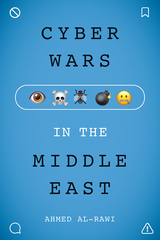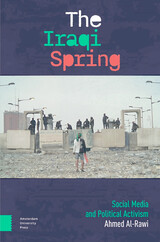3 books about Al-Rawi, Ahmed

Al-'Arabiyya
Journal of the American Association of Teachers of Arabic, Volume 50, Volume 50
Mohammad T. Alhawary
Georgetown University Press
Al-'Arabiyya is the annual journal of the American Association of Teachers of Arabic and serves scholars in the United States and abroad. Al-'Arabiyya includes scholarly articles and reviews that advance the study, research, and teaching of Arabic language, linguistics, literature, and pedagogy.
[more]

Cyberwars in the Middle East
Ahmed Al-Rawi
Rutgers University Press, 2021
Cyberwars in the Middle East argues that hacking is a form of online political disruption whose influence flows vertically in two directions (top-bottom or bottom-up) or horizontally. These hacking activities are performed along three political dimensions: international, regional, and local. Author Ahmed Al-Rawi argues that political hacking is an aggressive and militant form of public communication employed by tech-savvy individuals, regardless of their affiliations, in order to influence politics and policies. Kenneth Waltz’s structural realism theory is linked to this argument as it provides a relevant framework to explain why nation-states employ cyber tools against each other.
On the one hand, nation-states as well as their affiliated hacking groups like cyber warriors employ hacking as offensive and defensive tools in connection to the cyber activity or inactivity of other nation-states, such as the role of Russian Trolls disseminating disinformation on social media during the US 2016 presidential election. This is regarded as a horizontal flow of political disruption. Sometimes, nation-states, like the UAE, Saudi Arabia, and Bahrain, use hacking and surveillance tactics as a vertical flow (top-bottom) form of online political disruption by targeting their own citizens due to their oppositional or activists’ political views. On the other hand, regular hackers who are often politically independent practice a form of bottom-top political disruption to address issues related to the internal politics of their respective nation-states such as the case of a number of Iraqi, Saudi, and Algerian hackers. In some cases, other hackers target ordinary citizens to express opposition to their political or ideological views which is regarded as a horizontal form of online political disruption. This book is the first of its kind to shine a light on many ways that governments and hackers are perpetrating cyber attacks in the Middle East and beyond, and to show the ripple effect of these attacks.
On the one hand, nation-states as well as their affiliated hacking groups like cyber warriors employ hacking as offensive and defensive tools in connection to the cyber activity or inactivity of other nation-states, such as the role of Russian Trolls disseminating disinformation on social media during the US 2016 presidential election. This is regarded as a horizontal flow of political disruption. Sometimes, nation-states, like the UAE, Saudi Arabia, and Bahrain, use hacking and surveillance tactics as a vertical flow (top-bottom) form of online political disruption by targeting their own citizens due to their oppositional or activists’ political views. On the other hand, regular hackers who are often politically independent practice a form of bottom-top political disruption to address issues related to the internal politics of their respective nation-states such as the case of a number of Iraqi, Saudi, and Algerian hackers. In some cases, other hackers target ordinary citizens to express opposition to their political or ideological views which is regarded as a horizontal form of online political disruption. This book is the first of its kind to shine a light on many ways that governments and hackers are perpetrating cyber attacks in the Middle East and beyond, and to show the ripple effect of these attacks.
[more]

The Iraqi Spring
Social Media and Political Activism
Ahmed Al-Rawi
Amsterdam University Press, 2024
Since 2003 and following the U.S.-led invasion, Iraq witnessed tremendous changes to its political, social, and economic structures, and this book critically maps recent popular protests that engulfed the country and led to the death of thousands of civilian protesters. It delves into the nuances of the Iraqi socio-political context and offers a brief historical overview of political activism by investigating the internal structure of activism in the country as well as the regional and international dimensions. The study involves critical ethnographic research including interviews with Iraqi activists, social media analysis, Arabic and English news analysis, as well as in-depth assessment and contextualization of the Iraqi protests. The author argues that there is a need to call the protests an “Iraqi Spring” because of the country's unique historical, demographic, and political circumstances.
[more]
READERS
Browse our collection.
PUBLISHERS
See BiblioVault's publisher services.
STUDENT SERVICES
Files for college accessibility offices.
UChicago Accessibility Resources
home | accessibility | search | about | contact us
BiblioVault ® 2001 - 2024
The University of Chicago Press









